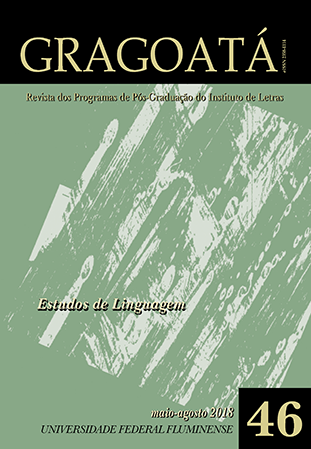Modelos psicolinguísticos de produção da linguagem verbal oral
DOI:
https://doi.org/10.22409/gragoata.v23i46.33584Palavras-chave:
Modelos psicolinguísticos. Produção verbal oral. Intenção pragmática. Mensagem. Planejamento.Resumo
Os modelos psicolinguísticos de produção da linguagem verbal se deparam com a dificuldade de formalizar as representações mentais das intenções pragmáticas para produzir um texto oral, bem como a dos conceitos essenciais, ambos com a função de orientar o planejamento textual. Tal dificuldade ocasiona desafios a designs experimentais que possam falsear hipóteses de trabalho (POPPER, 2004, p. 41-43). A maior parte dos modelos psicolinguísticos de produção da linguagem verbal oral se refere à abertura de um tópico e não ao diálogo em curso, na sequência à fala de um interlocutor. Aludo aos precursores, provindos da neurologia, como Broca (2004) e Wernicke (CAMPOS FILHO, 2002-2003) e examino os modelos psicolinguísticos, começando pelo pioneiro de Fromkin (1973), detendo-me, em maior profundidade no de Levelt e colegas (1999), com os aportes mais recentes (ROELOFS; FERREIRA, 2017). Os exemplos são todos adaptados ao português brasileiro (PB). Concluo com a hipótese de que, à medida que os níveis de processamento se tornam mais baixos, com paradigmas fechados, constituídos por um menor número de elementos, os processamentos são automatizados e encapsulados. Tal enfoque vai ao encontro da proposta de Fodor (1983), ao dividir os processamentos mentais em horizontais (os chamados processamentos criativos) e verticais (os processamentos compulsórios e modulares).
---
Downloads
Downloads
Publicado
Edição
Seção
Licença
AUTORIZAÇÃO
Autores que publicam em Gragoatá concordam com os seguintes termos:
Os autores mantêm os direitos e cedem à revista o direito à primeira publicação, simultaneamente submetido a uma licença Creative Commons Atribuição 4.0 Internacional (CC BY 4.0), que permite o compartilhamento por terceiros com a devida menção ao autor e à primeira publicação pela Gragoatá.
Os autores podem entrar em acordos contratuais adicionais e separados para a distribuição não exclusiva da versão publicada da obra (por exemplo, postá-la em um repositório institucional ou publicá-la em um livro), com o reconhecimento de sua publicação inicial na Gragoatá.
A Gragoatá utiliza uma Licença Creative Commons - Atribuição CC BY 4.0 Internacional.











